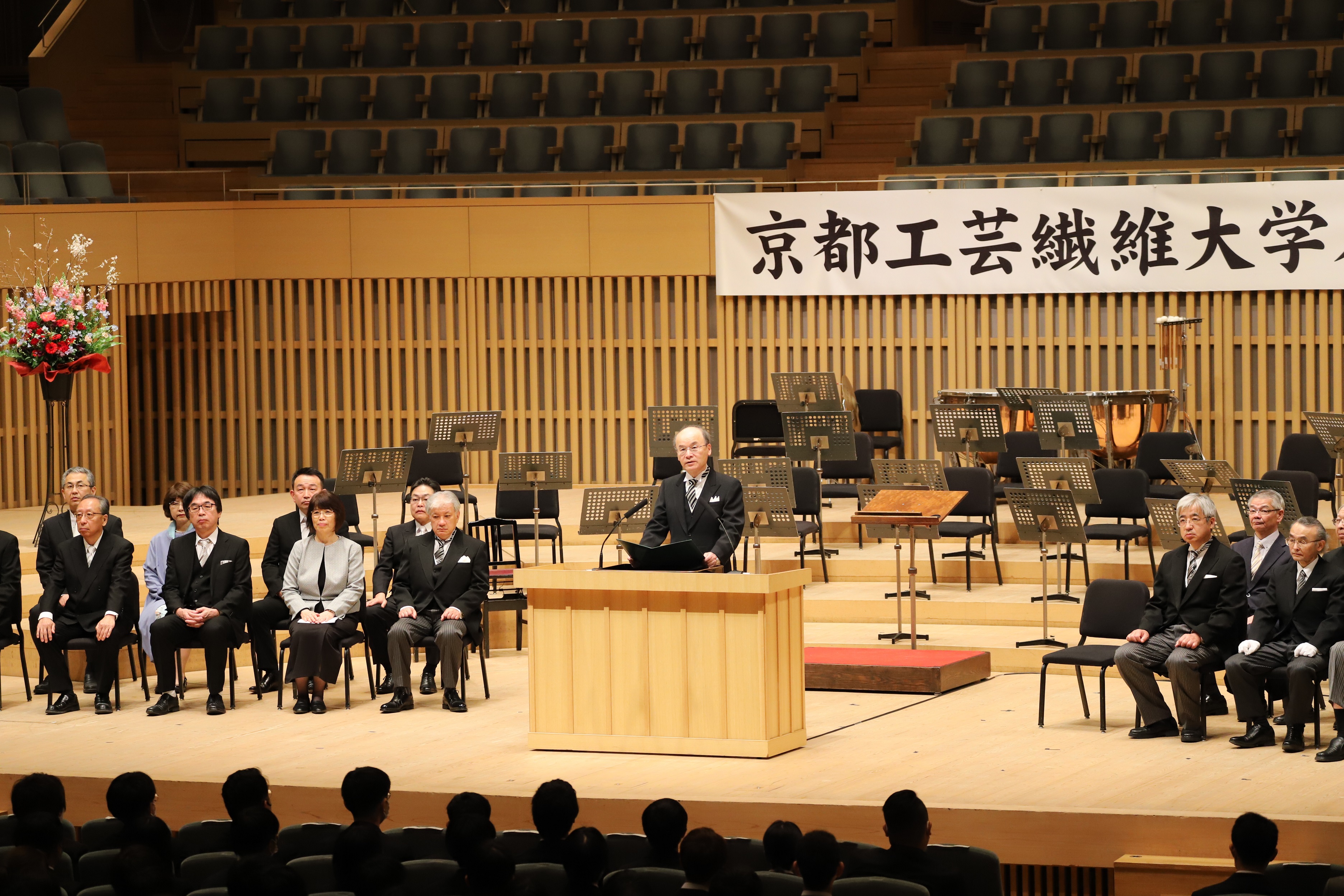The President’s 2023 Academic Year Pledge Ceremony Address for the School of Science and Technology and the Graduate School of Science and Technology
On behalf of the university, I would like to extend a hearty welcome to all of the new students who are joining Kyoto Institute of Technology’s School of Science and Technology and Graduate School of Science and Technology.
I would also like to sincerely welcome those of you who despite the various restrictions imposed by the novel coronavirus outbreak that went on for three long years, have come to be with us today. First of all, I want you to know that I respect your perseverance and congratulate all of you here today.

With regard to the Sustainable Development Goals for Humanity, which the UN General Assembly has called for us to reach by 2030, known as the SDG’s, although the 3-year pandemic of the highly contagious virus seems to have subsided, the difficulty of achieving the deadlines of global warming, energy and food issues, poverty inequality, and other issues is becoming apparent. It has been just over 20 years since the 21st century began. Clearly, we are entering a period in which the values of the post-industrial revolution society must undergo a major transformation.
In an era such as this and as our focus is science and technology, I would like to talk about the objectives of our university, in conducting research and education and fostering human resources with an eye toward the future. Those of you who have advanced from the undergraduate level to the graduate level already know what I am about to say, but I would like to remind you of its importance.
The purpose of education and research at the School of Science and Technology is “to nurture internationally-minded highly specialized technicians in science and engineering who can contribute to industry, society, and culture in the 21st century with innovative concepts, execution, and leadership; and who possess a broad knowledge and a high level of ethics.” The term “Tech Leader” is used here to refer to highly specialized technicians in the field of science and engineering. The master’s program of the Graduate School of Science and Technology nurtures individuals who have more advanced specialized knowledge and abilities than at the undergraduate level, who can flexibly apply these, and who have practical foreign language skills. In the doctoral program, we nurture human resources with outstanding research and development capabilities and international experience.
In addition, we have established standards for “technical competency” which consist of four fundamental characteristics of knowledge, technology, and human nature essential to a tech leader. The first competency is “professional competence,” mastery in your course and major, your major strength. The second is “Leadership,” the third is “Foreign Language Proficiency,” and the fourth is the establishment of “a true sense of self.” The specific content of each type of competency and the educational programs which cultivate them are described in the course guidelines of the School, and Graduate School of Science and Technology. The acquisition of these competencies is the foundation of our policy for awarding degrees. I ask that you keep them in mind as you prepare for the completion of your degree.
At KIT we advocate “Kyoto Thinking” as the foundation of our educational and research activities to nurture Tech Leaders. Kyoto’s culture developed with craftsmanship and trust in its skilled artisans and their high quality standards. At the same time, Kyoto has developed and gained recognition not only in Japan, but also overseas with its efforts to create new value both by passing on skills and by innovating as a response to challenges. At KIT, we express the spirit of creative challenge that Kyoto has nurtured as “Kyoto Thinking.” By applying and practicing this “Kyoto Thinking” to education and research, cultivate human resources who will lead the future.
In conjunction with this, we have established the following three concepts that serve as our vision for the university.
The first is ART×SCIENCE, which aims to create new value by integrating the ideas, visions, dreams, scientific fantasies, and innovations of ART that open up new future possibilities, in combination with SCIENCE, which provides concrete form grounded in precise analysis and logic, to the imaginings of ART. The second is LOCAL×GLOBAL. Here, we create new value by combining high quality manufacturing and trust-based “Kyoto Thinking” cultivated at the LOCAL level, with the GLOBAL Thinking needed to solve sustainability issues worldwide. The third concept is TRADITION×INNOVATION. This describes how we create trustworthy and unrivaled new value by combining a deep knowledge of history and cultural TRADITIONs with INNOVATION. The skills of Kyoto artisans have long been honed on this foundation.
This mission is unique to KIT and contributes to the development of a peaceful and prosperous society, a beautiful society that cultivates a highly developed aesthetic sensibility for the future of Japan and the earth by utilizing Kyoto Thinking, working to evolve education and research, and building next-generation social systems through the creation of new value.
Our faculty, staff, and current students are boldly taking on the challenges of ushering in a new era. We are looking forward to adding your strengths to the mix and hope that you will join us in our endeavors, and enable us to work together to realize a society that supports the wellbeing of all humankind and our planet.
Once more, I heartily congratulate you on this, the occasion of your enrollment.
April 5, 2023
President, Kyoto Institute of Technology
Kiyotaka Morisako
